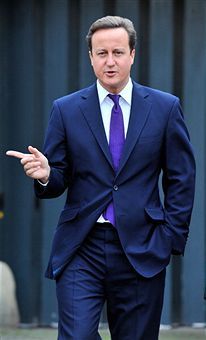 David Cameron just told the Tory conference that he supported gay marriage
“because I am a Conservative”. In last week’s issue of the Spectator, Douglas Murray said that the best arguments in favour of gay marriage are conservative ones. For the
benefit of CoffeeHousers, here is Douglas’s piece.
David Cameron just told the Tory conference that he supported gay marriage
“because I am a Conservative”. In last week’s issue of the Spectator, Douglas Murray said that the best arguments in favour of gay marriage are conservative ones. For the
benefit of CoffeeHousers, here is Douglas’s piece.
In America a new generation of Republicans is challenging the traditional consensus of their party on gay marriage. They — as well as some of the GOP old guard like Dick Cheney — are coming out in favour. In Britain the subject is also back on the agenda with the coalition government, at the insistence of the Prime Minister apparently, planning a ‘public consultation’ on the matter.
Though not exactly political leadership, this nevertheless constitutes a change — not least in stealing the mantle of gay equality from the left. For decades it was presumed that
conservatives could only oppose such moves. But as young Republicans like Margaret Hoover (author of American Individualism) are showing, that needn’t be the case. Indeed the best arguments
for gay marriage are conservative ones.
But first there are the non-arguments. Among them are those claiming that giving gays the right to marry somehow destabilises heterosexual marriage. But divorce and adultery are the biggest
underminers of marriage. Has any man abandoned his wife because of gay marriage? Then there is the slippery-slope argument. Tory MP Edward Leigh worries that if gays are allowed to marry,
‘There is no logical reason why the new alternative institution should be limited to two people. Why not three?’ he asks. ‘Or 33?’ All of which tells us more about his
imagination than his logic.
Few sights in politics are quite as risible as the male politician in full, puffing flight from an issue of basic gay equality. As the campaigning lawyer Elizabeth Birch said when arguing with the three-times-married conservative representative Bob Barr in 1990, ‘Which marriage are you defending? Your first, your second or your third?’
The idea that marriage is solely for the procreation of children is equally dismissable. Plenty of straight couples, particularly older ones, do not marry to have children. They marry to form a deep, committed and publicly respected bond. In any case, if protecting the special nature of marriage were the true drive of anti-equality activists, then they might focus instead on those celebrity and ‘reality’ stars who transparently marry for the publicity. Perhaps campaigners should picket Katie Price’s weddings?
But true conservatives should welcome gay marriage. For its increasing acceptance across civilised countries represents not the making gay of marriage but the making conservative of gays. The desire of an increasing number of gay men and women to have their stable and lifelong relationships recognised equally by family, friends and society as a whole demonstrates the respect of individuals within, and towards, an important institution.
Those who fear or dislike perceived aspects of gay life should particularly welcome gay acceptance into the marital fold. An aspect of male ‘gay life’ some heterosexuals claim to have a problem with is the perceived promiscuity. Whether this is in reality any more distinctive than among straight people, gay marriage offers a remedy, giving gays, like straights, a public and private path towards commitment. At a time when many heterosexuals are spurning the idea of marriage, here is a section of society positively lobbying for the right to respect and continue the institution. Perhaps gay marriage will encourage more straight people back on to the marital path?
Of course the argument most commonly made against gay marriage is the worst of all: the religious argument. Ignoring for a moment whether anyone really wishes to reinstate the practice of consulting ‘holy books’ for the specifics of law-making, the lack of consistency is extraordinary. A few months back I found myself debating a lady from the General Synod. The presence of a verse in the book of Leviticus was her justification for arguing against any rights for gays. ‘What about the imprecations against all sorts of dietary laws in the same book?’ I asked her. ‘What of the warning against the mixing of fabrics? What about that verse in Exodus, “Thou shalt not suffer a witch to live?”’ ‘Well, I don’t know anything about that,’ she said. Citing scriptural authority raises not only problems of source, but problems with the reading of a verse.
Nonetheless, if gays are allowed to marry there should be give and take. Marriage equality should not be forced on religious institutions. Religious people of all denominations might keep making the argument within their faiths. But there is no more justification in the religious being forced to accept things they claim to be against their beliefs than there is in the religious forcing their beliefs on everyone else. That should be the quid pro quo. If the religious want to enjoy freedom from the secular, then the secular should be able to enjoy freedom from the religious. But the reasons for denying basic equality on religious grounds is not only inconsistent, it has become desperate. Some people will seize any boomerang they can to resist the case.
For instance, in 2004 the former Conservative MP Paul Goodman voted against the introduction even of the halfway house of civil partnerships, fearing their introduction would ‘compromise an institution which is an integral feature of our social ecology’. Mr Goodman, now executive editor of ConservativeHome, is a married convert to Catholicism. Six years on from the Civil Partnerships Act becoming law, there is no word on whether it has compromised the ‘social ecology’ of his own marriage. But like so many other opponents of equal rights, he has now shifted his case. This time around, in opposing the government’s equal-marriage proposals, he cites among other things the importance of canvassing Muslim opinion in any plan for equality. To call this disingenuous is to state the situation too generously.
The religious case against equal rights can — and probably will — be argued till the end of time. But the effort to deny equality to members of society on shifting religious grounds and nonexistent practical ones is a war on decency as well as on conservative sense. The government should lead the way against this, not with a drawn-out consultation but a clear demonstration of what belongs to the secular state and what belongs to the religious conscience. Future generations of married people, straight and gay, will thank them for it.







Comments